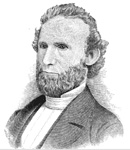About the author…
Hubbard Winslow (1799-1864) graduated Yale Theological Seminary and spent much of his life as a Presbyterian pastor. His most influential works include Are You a Christian?, Intellectual Philosophy, and Moral Philosophy. The Historical Magazine adjudged "in the province of philosophy he had few equals." Intellectual Philosophy was a popular 19th century textbook wherein he surveys the history of philosophy and, as well, relates influential thinkers to Christian philosophy in an accessible manner.
About the work…
In his
Moral Philosophy; Analytical, Synthetical, and Practical, Winslow argues that basing ethics on theoretical philosophy is a "prevailing error." Metaphysics and logic, he argues, are not subservient to everyday consciousness of freedom and responsibility. In this reading, Winslow argues that philosophy should be used in the service of faith. He believes faith is a direct "manifestation of the truth" presented to each person's conscience and adduces just as "[w]e must not wait until we can philosophize upon food before we eat…" so also "[n]either should we wait to learn all the grounds and reasons of duty, before doing what we already know to be right."
According to Winslow, what is "the exclusive dominion of conscience"?
How does Winslow characterize the two elements of conscience? How are these psychological elements related? How are they united?
Explain Winslow's definition of conscience.
What is the distinguishing faculty of conscience according to Winslow? What is the reason he gives that the pleasure of doing one's duty differs in kind from the pleasure of good company?
Discuss Winslow's three main functions of conscience.
How does Winslow account for persons who do not immediately feel remorse when the have knowingly acted wrongly? Describe the "law of the operation of conscience." Does he presume all persons have a conscience?
